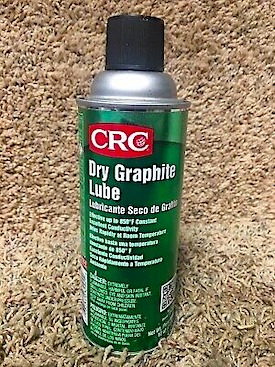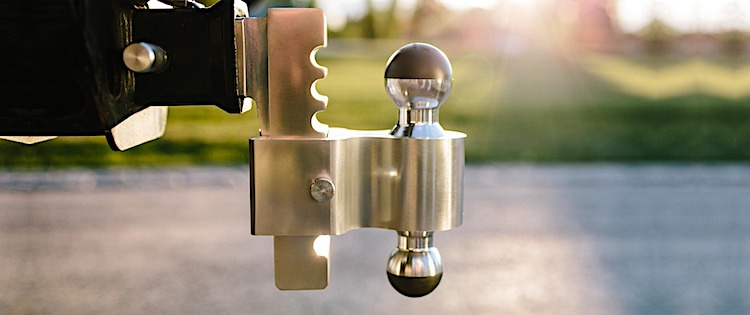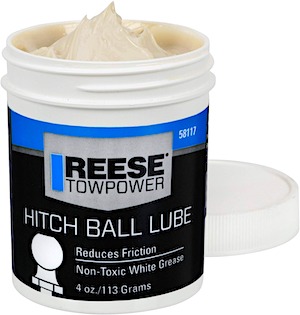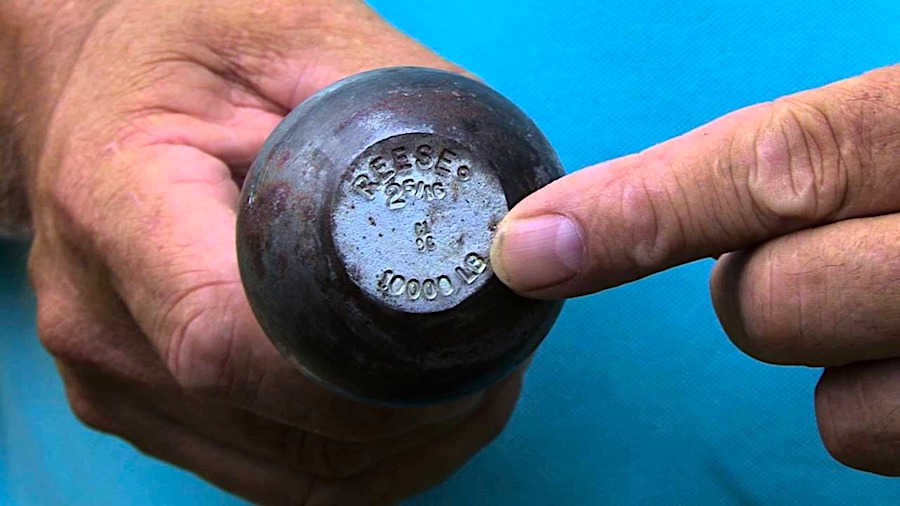Thanks for your support! If you make a purchase using our links in this article, we may make a commission. And, as an Amazon Associate, I earn from qualifying purchases. See the full disclosure here.
One question many people have regarding the maintenance of the trailer hitch ball is – Should I grease my trailer hitch ball or not? The short answer is that you should if you want to maintain it properly. Grease is one of the most effective tools for preventing rust, corrosion, and heat build-up on a trailer hitch ball.
The trailer hitch ball is an interesting aspect of every trailer. It can incredibly useful, but many people don’t use it properly and don’t know how to maintain it. Most people will let it get rusty and never use it as a result. However, if you take the time to maintain it, it can be a very useful part of your RV.
That being said, there’s a lot to learn about why you need to grease your trailer hitch ball and how to do it. As a result, you’ll want to keep reading so that you can learn as much information as possible.
Should I Grease My Trailer Hitch Ball?
If you want to ensure that your trailer hitch ball is properly maintained, then you should definitely consider using trailer hitch grease. If you don’t use grease or a grease alternative it will only be a matter of time until your trailer ball hitch gets rusty.
It’s recommended that you use a dry graphite lubricant like CRC Dry Graphite Lube so that you can prevent dirt from sticking to the hitch. One of the biggest concerns opponents of trailer hitch grease have is that it can attract dirt. However, if you use a dry graphite lubricant it will keep dirt away while still maintaining your trailer hitch ball.
Additionally, when you apply grease you should make sure to wipe off any old grease that was there before. Having old grease build up can cause damage to the hitch, as well.
An alternative to using grease is to place a cover over your trailer hitch ball when it isn’t in use. However, this has limited effectiveness since there will be a lot of time where your hitch ball will be exposed to the elements when it’s in use.
As a result, it’s better to try to maintain the trailer hitch ball by greasing it rather than just using a cover. You can still use a cover if you grease it, so you don’t need to grease it as often. However, it shouldn’t be your only preventative action.

Do I Have to Grease My Trailer Hitch Ball?
You do not need to grease your trailer hitch ball. That is entirely up to you. However, greasing it is recommended. Greasing will help ensure that the trailer hitch ball keeps its structural integrity, and it will help prevent it from squeaking. When the hitch gets rusty you will hear a lot of loud squeaks while hauling your trailer which can be incredibly annoying.
However, the decision to use grease is entirely up to you. Your RV or trailer won’t break down because you don’t grease the hitch ball, but it is a great tool to help with maintenance.
Can I Grease a Rusty Trailer Hitch Ball?
If you own an RV and you’ve never greased your trailer hitch ball before, there’s a good chance it developed some rust over time. If there is only a little bit of rust on the ball you can still grease it and increase the lifespan of the hitch ball.
However, if you’re trying to fix a ball that is completely covered in rust, it’s too late. At this point, it might even be unsafe to use the trailer hitch ball. If you find yourself in this situation, you shouldn’t try to grease the ball. Instead, you should try to find a new one and replace your old, rusted, trailer hitch ball.
If I Need a New Hitch Ball, Which is the Best Trailer Hitch Ball?

If you’ve determined that your trailer hitch ball is too rusty to fix, you’ll need to get a new one. Unfortunately, picking a new hitch ball isn’t as easy as picking the one that looks best at the store. There’s a lot you need to consider.
The first thing you need to do is take a look at your ball mount and get the information you have on it. Ball mounts vary in terms of hitch ball size, type, weight capacity, price, features, and vehicle compatibility. As a result, you will need to find a trailer hitch ball that is compatible with your ball mount. If you pick one at random you will likely find that it won’t even fit on your mount.
As a result, we can’t give a list of the best trailer hitch balls for you. You will need to assess which ones are compatible with your mount. However, this shouldn’t be too difficult. You should be able to find this information easily online.
How Often Should I Grease My Trailer Hitch Ball?
At a minimum, you should grease your hitch ball every spring and fall. However, when you do decide to reapply grease you should wipe it clean before applying a new layer of grease.
It’s also a good idea to grease it before you leave on a trip. Your trailer hitch ball is most likely to be exposed to conditions that could test the grease when you’re away from home. As a result, applying a new coat of grease before you leave is a good idea.
What Is White Grease Hitch Ball Lube?
White Grease Hitch Ball Lube is a heavy-duty lubricant that is used for metal to metal applications. Lithium acts as a thickener that provides structure to hold the oil in place, and it also acts as a sponge by releasing small amounts of oil during use.
This will help extend the lifespan of your hitch ball, which will make it easier to connect and disconnect the hitch ball. The lube is non-toxic, and it’s designed so that it won’t break down.
Furthermore, the lubricant is water resistant, so you don’t need to worry about it washing away in rain. It’s a great option for someone looking for a hitch ball lubricant to prevent their hitch ball from getting rusty.

Are There Better Alternatives to Trailer Hitch Grease?
If you don’t want to grease your trailer ball hitch, you can explore other options. There are a few that you have to choose from. Firstly, you can use a solid candle to coat the hitch ball. This method will create a lot of mess, but it’s easier to manage than grease. You can also use motor oil to get the job done. Both alternatives will get the job done to varying degrees. However, there’s a reason that most people use grease, and that’s because it’s the most durable and the most effective.
How to Grease a Trailer Hitch Ball
The first thing you’ll want to do is wipe down your hitch ball to ensure that there isn’t any leftover grease. You then should check for any signs of rust. If it is covered in rust, then you should replace it. However, if there is only a little bit, you can try to remove it with sandpaper if it isn’t chrome. Once this is done you can get started applying the grease.
When you’re applying grease, you’ll want to make sure that you get it on the entire surface of the hitch ball. Otherwise, the portions of the ball that aren’t covered could be at risk of getting rusty. As a result, you should apply the grease liberally. You can apply it directly with your fingers because grease isn’t toxic.
After you apply the grease it’s still a good idea to keep the trailer hitch ball covered whenever possible. The grease will do a good job of protecting it from the elements, but there’s no reason not to take every action possible to extend the lifespan of your hitch ball. Having it covered will extend its lifespan and reduce the frequency that you need to apply grease.
Is Grease a Necessity for RV Owners?
After reading our article, we hope you have all the information you need on applying grease to trailer hitch balls. We know there’s a lot of information to absorb, but we wanted you to be as informed as possible.
Remember that you should always wipe your hitch ball clean before reapplying grease. You should apply grease liberally, and frequently. It’s better to apply grease more often than you need rather than to apply it too infrequently. As long as you keep an eye on your trailer hitch ball, you shouldn’t have in issue keeping it from rusting.
Do you understand how to apply grease to a trailer hitch ball? Have you ever applied grease to a trailer hitch ball before? Let us know in the comments!



The ball I have for towing a 20′ glass bass boat has a hard black plastic on the top halve of the ball. I have used it for years. In fact it’s my second one. After years the very top of the hard plastic will get a hole about 5/8″. Alittlegrease on that part might be helpful. They are hard to find anymore. Not sure why they are not readily available.
CRC dry graphite lube vs hitch ball lube (white grease) for trailer hitch ball?
both are in the article, should I use both or just one or the other?
I have towed equipment trailers, concrete pumps, compressors as well as recreational equipment. Literally 100,000s of miles. I don’t grease the ball or the coupler. I’ve never wore out a ball or a coupler.
Leaving a trailer ball and mount on a vehicle, is essentially leaving a battering ram on the rear of the vehicle. It defeats the safety aspects of the bumper, and frankly should not be permitted. Having it damage another vehicle while backing up, and having knee damage are also good reasons to remove it. The hitch portion should be removed when not in use and stored in the vehicle. Put it in a plastic bag if you wish to grease it.
Hi Norm,
Thanks for sharing this info!
Mike
A lot of hitches are frame mounted and are not the receiver type. The ball mount protrudes past the bumper the same regardless whether the ball is installed or not.
Not lubing the ball will also wear out the coupler faster. As a welder / fabricator I don’t know how many couplers I have replaced because of the ball wearing THROUGH the coupler. Yes I have replaced couplers that were worn all the way through, so that is something people also need to check before coupling the trailer to the tow vehicle. The trailer ball is made of harder steel than the coupler which wears the coupler out faster then the ball.
Hi David,
Thanks for the info about the coupler!
Very informative.
Mike
I have been using lubriplate for years.
each time i unhitch i wipe with a rag and re apply.
Anderson weight distribution hitches do not want you to lubricate the ball as it will affect the friction necessary for anti-sway.
As the previous person said you should always grease a trailer ball because it is metal to metal contact and if not lubricated it will cause galling of the ball and in the hitch where the ball rides. Galling is the transfer of metal from one surface to another cause by friction. Yes, you can just replace the ball when that happens but replacing the hitch itself because of the wear is costly and needs to be done by a professional welder in most all case. The tongue weight of two metals rubbing against each other without lube causes the galling/wear. If let go long enough you won’t be able to keep the hitch to ball clearance tight and it will cause it to pound while going down the road going back and forth. I just put a sandwich bag over the ball when not in use as the grease will hold it in place. I wipe off the ball and the hitch socket when the grease gets dirty and then just reapply new grease. You should also apply grease on the ball and sockets ends on friction sway controls. Do not put in on the friction area…
An unlubricated hitch ball will eventually destroy the ball and coupler. Under a full load the ball will gall and start sticking to the coupler and that process can loosen the ball which can cause more problems. I have been towing for over 50 years and rust has never been an issue unless you are one of those who leaves the ball in the tow vehicle when not in use so it gets exposed to the elements.
So your “Is Grease a Necessity” statement should be much more like “Absolutely and often…”.
Grease also helps protect your hitch. A dry hitch and a dry hitch ball will cause heat and excessive wear (metal to metal). Greasing the hitch ball provides lubrication much like the oil in an engine.
Aside of the obvious to prevent as much as possible, rusting of the Ball, greasing the ball also prevents or lessens the difficulty of unhitching after a long travel distance especially the summer when temps. are high. Being in the SW I find, that by greasing the ball, it is much easier for separation of the ball from the TT. Cleaning the lock mechanism periodically prevents build up of grease, and grime and allows it to function much easier, for an easy release. Many times I, as well as others, have had to bounce on the bumper to get disconnected. I found by cleaning grease and grime build up in the ball socket and lock mechanism; and consistently applying white lithium grease, or equivalent, all over the ball, completely eliminated the bumper bouncing for disconnect. Good article, because I have heard salesman at RV shows claiming their hitches require NO grease….
What if your hitch ball is stainless steel?
I used a vacuum grease is this ok?
I went camping this past weekend with some RV friends. I noticed that they had grease on the trailer hitch ball. I asked them why as I have never seen this before and that they are new to hauling trailers and learning camping and buying the latest and greatest camping stuff. They told me it was needed as stated above in the article. Folks I have pulled just about every trailer you can since I was 14 across the USA. Snowmobile trailers, Heavy equipment trailers, horse, boat, utility, car, cargo, MX, trailers. I own three trailers right now. I have several different size balls that I use. I pull a trailer weekly and I have never put grease on my trailer hitch ball. I own a dozier, backhoe and 9000 lb. tractor, 18′ boat and I never used it. I just bought a new trailer to haul 14,000 lbs. and the manual that came with it never covered it. I have close friends who work on heavy equipment and they don’t put grease on their personal trailers. You can if you want but I would never do it. The grease will get on your clothing, collects dirt and may get into your wiring system when you have to adjust the trailer and ball. Again, do what you want, but it is something that doesn’t need to be done. The the big thing with trailers is, make sure you have a really good ground. Thanks for reading. Greg T.
I use white lithium grease cause I had a big assed tub of it. Applied liberally and all the squeeks and grinding is gone. We put about 12000 KM on our rig a year so I do it every month. Clean it really good with paint remover (Varsol), then clean the paint remover with alcohol. Clean dry ball every time.
I am a girl. I HAVE to have grease on the trailer ball always, or else it becomes impossible to “connect and disconnect” the trailer hitch coupler. I also use lithium grease to keep the coupler moving freely. At first, I didn’t know that and I had to take the coupler OFF the shaft of the trailer in order to pry it free from the ball. Awful! And it was raining the whole time. Never again!
I remove the ball assembly when not in use, store it in the spare tire enclosure. The ball is raped with a oily shop cloth in a plastic sandwich bag.
Do that for over 50 years, no problems.
Larry Strickland
Greasing a hitch ball is very important. It is the pivot point between truck and trailer and is steel on steel. Without grease cornering can be hindered. Metal on metal will resist turning. Tractor trailers rely on their 5th wheel being lubed. Otherwise they tend to continue in a straight line if the road surface offers less resistance than the friction on the 5th wheel plate. Imagine coming down a hill in the rain and coming to a corner a little too fast with no grease to allow smooth cornering transitions! The hitch will bind initially then suddenly release as the forces overcome resistance. Ask any race driver what happens to sudden movements near the limits of adhesion…. He’s the guy on the sidelines with his car wrecked. Or ask a veteran truck driver.
I have over 40 years as one and have never been in the ditch!
Be safe fellow travellers.
Keeping the grease off of you is a challenge while the trailer is unhooked and you don’t want to take the hitch off the tow vehicle. I keep a supply of plastic bags ( the ones you get from the grocery store ) and repurpose them. Just tie it around the hitch tight. I’ve never had it come off prematurely.
better is spray silicone. Just clean and spray the ball after every use or 2000 km of towing. No mess and very effective.
Silicone is known to attract water unless it has a clean seal. On a trailer ball with continuous friction that’s not the best choice. If you keep your balls exposed to should always use bearing or high temperature grease. Let it collect some dirt in between uses. Just simply give it a gentle wipe and reapply a thin coat before hitching up. It simply takes seconds and you have protected from rust between use and have applied a little protection before you haul. If you are using a garden or utility trailer you may get away with the silicone, but this article keeps referring to RV usage. That ball can get extremely hot from the friction and needs a high temperature grease used. It will also ease backing because it can swivel easier and it can extend the life of your balls.
Here are my thoughts: I have several hitches/balls that I use throughout the year. Yes, I do pull a trailer even in the winter months. First, I recommend that you store your hitch inserts and balls when they are not needed. I usually check my hitches during spring and then in winter. The hitches are just as important as the balls. If there are any signs of paint chipping or rust, I strip the paint or sand off the rust, primer and repaint both. I let the new paint cure and then coat the ball in grease. This way, when I need it, it is ready to go.
I have been towing for fifty years and have resisted greasing the tow ball.
1) The chances of someone getting grease on their pant legs and suing me for cleaning or damaging their clothes is a real concern. However;
a – Some of my friends use a tennis ball sliced and popped it over the ball when not in use has it’s merits.
b – When the tow ball is not in use, I remove the hitch. I have seen more than enough people in a shopping mall parking lot kiss their shins on an exposed hitch, with or without the tennis ball. Just another part of trailer edification.
2) You dont need a large amount of grease, just a thin smear.
3) Dont have the coupling too tightly adjusted, just a light contact is all that is needed.
You have neglected to address the hitch itself. It is most important to thoroughly clean the mount that the ball goes into. Dirt and sand will accumulate inside and will rub and wear on the ball. So each time you apply grease to the ball, the inside of the hitch should be well cleaned.
Will graphite do the job?
I usually smeer some synthetic grease on the ball, when I disconnect the trailer I wipe the ball clean and remove the ball and mount assembly and store it in the back (Covered)of my truck.
Good article! I use the Reese White Grease Hitch Ball Lube you mentioned. https://amzn.to/2TsFkCz
I’ve been using regular wheel bearing grease on the ball hitch, and applying it with my fingers before starting any camping trip. I keep the can of grease in a plastic Ziploc bag in the side compartment of the camper so I can grease the ball hitch again before the return trip. I think I’m going to check out that CRC Graphite lube. Seems like it will be a lot easier to apply, less mess, and better lubricating features.
I did forget to mention DO NOT GREASE ANDERSEN WEIGHT DISTRIBUTION HITCH BALL.This hitch is designed to use friction as a method of controlling sway.
I use spray on white lithium grease. I keep a can in my truck. Wipe the ball clean and reapply before hitching up every time. Leave on after use to prevent rust.
White lithium grease is also good for many other things around the rv.
It does stick very well and has a tendacy to build up if not removed occasionally.
You hit the nail on the head, White Lithium grease is a life saver not just for hitches any joint spring out side axeles any metal to metal joints.
Hi JJ,
Thanks for your comment!
Mike
Absolutely. It is metal to metal and so some protection should be used. I use a marine grease because I have it in my shop. I put some on my index finger and coat around the ball. Clean up and will do again next year.
If you are looking for a clean and convenient way to grease your hitch check out EZ Grease’n Go. Compact pucks made to grease your hitch in a matter of seconds. Maintain your trailer hitch for safe travels.
Hi Megan,
Thanks for sharing this info!
Mike